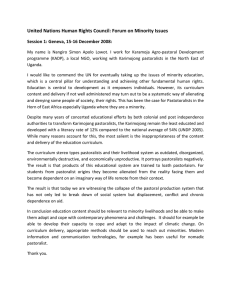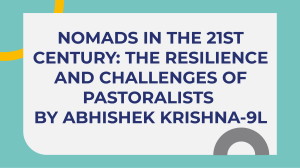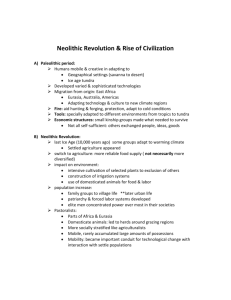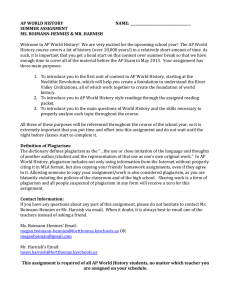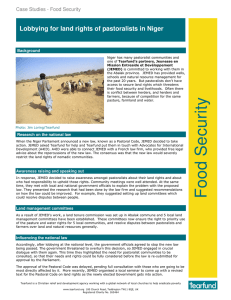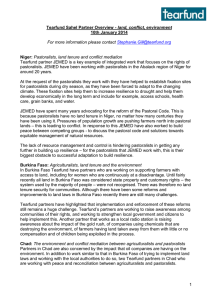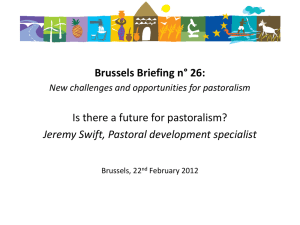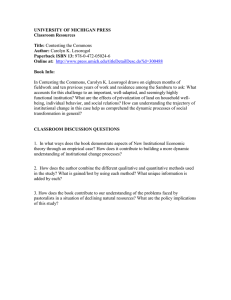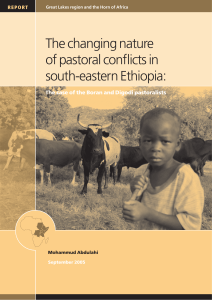Denebo Dekeba GudinaTumsa Foundation P0. Box. 4003 Addis Ababa
advertisement
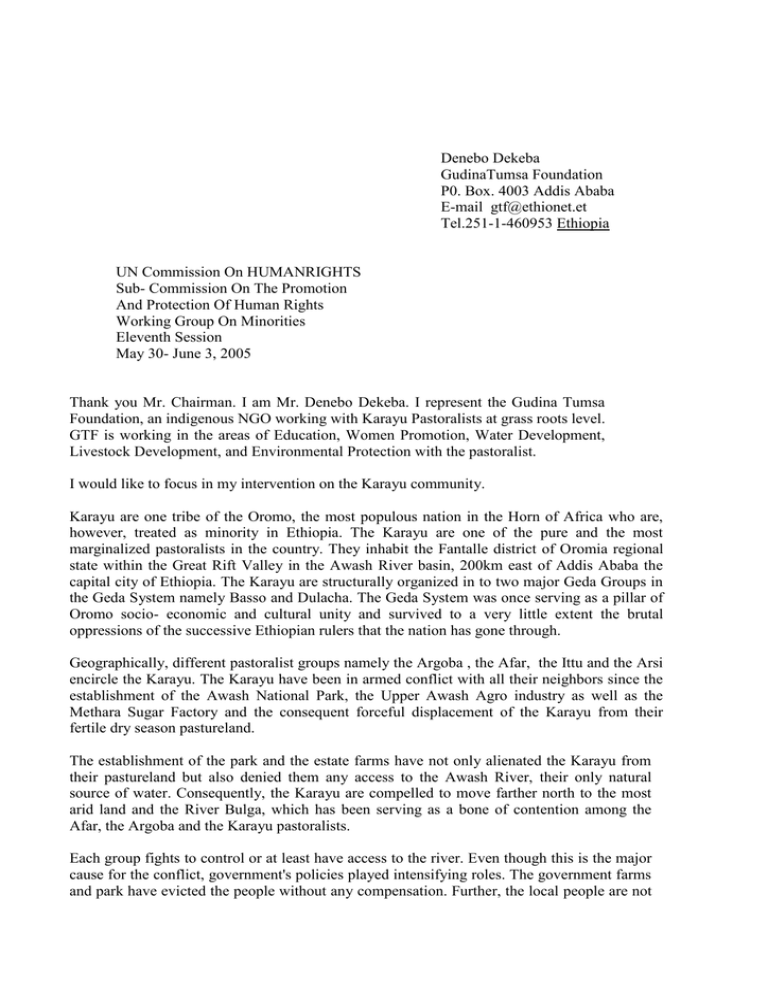
Denebo Dekeba GudinaTumsa Foundation P0. Box. 4003 Addis Ababa E-mail gtf@ethionet.et Tel.251-1-460953 Ethiopia UN Commission On HUMANRIGHTS Sub- Commission On The Promotion And Protection Of Human Rights Working Group On Minorities Eleventh Session May 30- June 3, 2005 Thank you Mr. Chairman. I am Mr. Denebo Dekeba. I represent the Gudina Tumsa Foundation, an indigenous NGO working with Karayu Pastoralists at grass roots level. GTF is working in the areas of Education, Women Promotion, Water Development, Livestock Development, and Environmental Protection with the pastoralist. I would like to focus in my intervention on the Karayu community. Karayu are one tribe of the Oromo, the most populous nation in the Horn of Africa who are, however, treated as minority in Ethiopia. The Karayu are one of the pure and the most marginalized pastoralists in the country. They inhabit the Fantalle district of Oromia regional state within the Great Rift Valley in the Awash River basin, 200km east of Addis Ababa the capital city of Ethiopia. The Karayu are structurally organized in to two major Geda Groups in the Geda System namely Basso and Dulacha. The Geda System was once serving as a pillar of Oromo socio- economic and cultural unity and survived to a very little extent the brutal oppressions of the successive Ethiopian rulers that the nation has gone through. Geographically, different pastoralist groups namely the Argoba , the Afar, the Ittu and the Arsi encircle the Karayu. The Karayu have been in armed conflict with all their neighbors since the establishment of the Awash National Park, the Upper Awash Agro industry as well as the Methara Sugar Factory and the consequent forceful displacement of the Karayu from their fertile dry season pastureland. The establishment of the park and the estate farms have not only alienated the Karayu from their pastureland but also denied them any access to the Awash River, their only natural source of water. Consequently, the Karayu are compelled to move farther north to the most arid land and the River Bulga, which has been serving as a bone of contention among the Afar, the Argoba and the Karayu pastoralists. Each group fights to control or at least have access to the river. Even though this is the major cause for the conflict, government's policies played intensifying roles. The government farms and park have evicted the people without any compensation. Further, the local people are not given any opportunity including employment to benefit from these economic firms. Thousands of workers and laborers are brought in to Karayu land from other areas of the country. Outsiders coming to Fantalle created population pressure thus pushing the Karayu pastoralists farther to the most arid areas and causing depletion of the natural resources, pasture and water. Clashes along borderlines could easily occur on daily basis among the pastoralists who are constantly moving from place to place in search of water and pasture. In recent years, the shrinkage of pastureland and depilation of resources coupled with recurrent droughts has changed the nature and magnitude of conflicts, which are getting more severe. The weakening of traditional conflict resolution mechanism is the other factor to which the intensification of the conflict is attributed. Clashes occur more than twice a year and claim many lives, and result in the loss of cattle from either side. The following are some of the socio-economic and political consequences of the conflict Gender problems among the Karayu are more complicated because of the conflicts. Women's workload per household is increasing, as a large number of men die and others are severely injured in the battles. Women must take care of them besides taking care of the increasing number of orphaned children. Many Karayu youth leave school during the conflicts to join the fight. This has made the number of school dropout notably high. The general instability in the region is the other consequence of the conflict. The fact that the pastoralists spend many of their scarce resources on buying weapons and ammunition to secure themselves has added fuel to the deteriorating economy beyond escalating the conflict. The regional governments and the federal government that are only recently giving emphasis to the pastoralists' development have made no remarkable effort so far to deal with the root causes of the conflicts among the pastoralists. The policy is only on paper yet no practical steps have been taken in this regard. The violence and conflicts, which always, result in negative repercussions, need immediate intervention to be resolved or at least stopped from escalating. In this respect I recommend the following actions to be taken. Traditional conflict management mechanisms ought to be strengthened among the pastoralists to promote peace and stability in the region. The government should agree to the request made by the UN special reporteur to visit Ethiopia on the right to education. The specia raporteur should pay particular attention to the situation of pastoralists during the visit. The UN should influence the Ethiopian government to encourage the Civil Societies and NGOs working with the pastoralist and allow them to carryout their work freely and independently.
